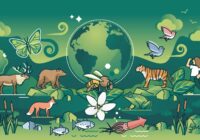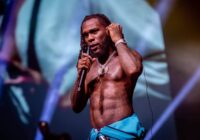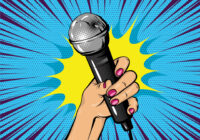On March 2, 2024, the Irish rock band U2 performed its final of 40 shows in a concert residency at Sphere, a cosmic kaleidoscope of lights and Las Vegas’s newest crown jewel.
When I stepped out of the airport and into Las Vegas, I felt like I had entered the outer edge of the universe. The low skyline met with the ancient seabed, and the city seemed to float in the azure sky. It was as if I were in a snow globe with toylike monuments — the Eiffel Tower, the Empire State Building and a pyramid were all around me. As night fell, the proprietors of the globe flicked a switch, lighting Las Vegas up. “Sin City” swaggered to center stage out of an innocent daytime.
And then there was Sphere. It was like its own planet within the galaxy of Las Vegas. Its phantasmic exterior lighting made it appear as a giant, extraterrestrial eye. U2 wielded Sphere to eclipse the typical characterizations of the infamous city.
U2’s shows at Sphere went beyond concerts; they were full-body journeys that enveloped each audience member with wraparound illusions. This held true even at the very outset, as the dome was made of faux cathedral stone that seemed to spiral to the stars above.
Although drawing from multiple albums, the shows centered on U2’s 1991 album Achtung Baby. The band, with lead singer Bono, had previously staged the album in the 1992 Zoo TV Tour. Sphere, decked out with the world’s largest LED screens and costing $2.3 billion to construct, opened the door to a new type of concert.
Intensity vs intimacy and meeting past selves
U2’s performance style had taken a turn in 1992, escalating from relatively unembellished stage setups to sensory overload. With their revolution of rock show techniques, fans grew concerned that the spectacle could diminish the music. That’s why it is paramount to learn how the band approached its new show in this regard.
After my trip to Las Vegas, I had the opportunity to interview Bono about the show.
India Nye Wenner: The first topic I want to discuss is U2’s relationship to the audience in the fresh Achtung Baby production, and how you dealt with the immersiveness of Sphere.
Bono: Originally, when Achtung Baby came out, we had a tour called Zoo TV. Part of it was deliberately disorientating. We wanted not to have a friendly relationship with our audience. It was a kind of confrontational relationship. We bombarded our audience with media; I shapeshifted into your worst-nightmare rock star. It was the time of grunge, and everyone was kind of thinking, “We’re really authentic, man, we’re wearing plaid and we don’t believe in even a light show.” We said to ourselves, “We’ll go in the exact opposite direction and be the opposite of authentic, and we’ll bombard our audience.” These were more art principles than music principles.
With this show, it’s the same. It starts in what’s known as Plato’s Cave. But it starts, really, at the invention of fire, if you want to think of it like that — early experiences of cave paintings, aloneness. I walk out on stage without any glasses and I sing this ancient Irish melody, and it feels like you’re in a cave. And then it quickly moves to a nightclub in Berlin in the 90s and it gets all very kind of decadent and fun and playful, and we become your worst nightmare of rock stars — which is kind of fun, too, ’cause playing that up is fun. So we let the ego run rampant for a while, so even that’s not super connected. In the middle […] you have songs like “One,” which do connect. But it doesn’t become truly intimate until we get to the bit where we turn off the technology.
Wenner: As an attendee of two of U2’s Sphere concerts, I can attest to the energy shift that accompanied the middle of the show.
Bono: We break things down into this kind of acoustic, radical intimacy, I would call it. Because of the acoustic technology in Sphere, Sphere itself is a speaker. And no matter where you are in Sphere, you get perfect sound. You’re able to whisper and be heard at the very back. So we realized that the acoustic set where we’re just playing acoustic guitar and these deconstructed versions of our songs is as powerful as the big visual extravaganza. Because you had been so disoriented by the first part of the show coming at you at full throttle, when we got to this moment of intimacy, it was really intimate. People started to sing, people got very emotional and they opened up more.
Then we get to this bit that I’m just talking to you about: the breakdown acoustic set on [musician] Brian Eno’s stage, a turntable with algorithms that change its colors. Then we get back into more visuals and then finally into this cathedral of the natural world, which [stage designer] Es Devlin designed with all the endangered species of Nevada. And people get really emotional at that point. And I’m looking out there, and there are people with tears in their eyes — a lot of them are men. And sometimes I’m one of them.
Wenner: Each U2 show at Sphere lasted a little over two hours. With over 20 songs, 120 minutes, 18,600 attendees and 1.2 million LEDs, I’m curious to hear how you made sense of such vast potential.
Bono: The arc of the show is the thing that’s most successful. In theater, you have a sort of arc. And to get to what the Greeks call catharsis, you have to go on a journey. So I think that’s why this show worked well. I think you allow the visuals to overpower the music because in the end, the music comes back and […] wins. I wondered: If it was like that all the way through, would it have been as powerful? I don’t think so. It’s the arc, this theatrical arc.
You just always enjoy a three-act structure, believe it or not, even though most rock ’n’ roll bands are like jukeboxes. They just play their songs, and it’s great, because it might be different every night. With [rock singer] Bruce Springsteen, you never know what you’re gonna get when you see him play, which is amazing. Bruce is so clever. He creates a three-act structure just with his music every night. But to do it with visuals of this scale, you have to lock in a few things. And so in that sense, it’s a little restrictive. But I think it’s a worthwhile compromise to make.
Wenner: In your Zoo TV Tour of Achtung Baby, you were 32 years old. Now you’re 63, and you’ve just performed the same songs you wrote 31 years ago.
On top of revisiting the past, as lead singer, you were tasked with maintaining harmony as a pillar amidst the tsunami of Sphere’s visuals. U2 was just four men within the universe of lights. What did you learn about yourself as a performer throughout the show?
Bono: I have to confess to you that I still suffer from a kind of stage fright. I can wake up in the morning, and it’s not that I think I can’t sing the songs — it’s just I wonder if I’ll have the essential energy to really make tonight the best night. U2’s grandiosity or arrogance, or whatever you want to call it, is [that] we want every night we play to be not just a Friday night, we want it to be New Year’s Eve. Every night. That’s our insanity. We go out with that kind of commitment.
What I was so surprised by performing those sounds was stepping inside the songs. I discovered the person who wrote them 20 years ago, 30 years ago, whatever it was. And it was a challenge — you meet your different selves. I could see some ways that I’d grown and become, I think, a better version of myself. But I could see in others where I hadn’t grown.
In order to sing these songs, I have to really get inside them. The songs towards the end are very emotional; they’re quite operatic. To be able to sing them, I gave everything I had — and I discovered that I didn’t want to go out after the show. Or I couldn’t meet anyone before. When I was younger, even ten years ago, I’d be the guy who’d be saying hello to everybody, going out afterwards, having a laugh. But this show was very demanding, so I accepted that while I’m here, this show owns me. My best friends would come by and I wouldn’t get to see them. I’d be preserving my voice. So it’s been quite challenging on that front. But when I’m on stage and with the band, I am so alive. And I’m okay if it’s just two hours a day that I’m fully alive.
Achtung Baby’s new relevance and the perils of love
Early in the show, a projected stone wall cracks apart. This is a nod to the dismantling of the Berlin Wall. It allows brilliant light to seep through its cracks and set the venue aglow. Today, in contrast to the unity that came in 1989 in Germany, walls are being built up across the world. Bitter divides have gone up in the Middle East, social battlements mortared with intolerance in America. And Russia continues to brutally encircle Ukraine.
By putting the spotlight onto Achtung Baby again decades later, U2 urges listeners to hear the songs in the larger context of our modern world.
Wenner: What made Achtung Baby, as opposed to The Joshua Tree or Songs of Innocence, the album to be re-energized and to bring Sphere to life?
Bono: We’d made two albums before Achtung Baby: One was The Joshua Tree, and another was called Rattle and Hum, which was really an extension of The Joshua Tree. So we really wanted to move away from a focus on the United States, on America and its mythology, to a more European perspective. It just felt fresh for us to get involved in electronic music. We went to Berlin just as the wall was coming down and the Soviet Union was ending, and freedom was growing around the world. It was a very exciting moment to be in Berlin, when the wall came down and the world changed shape almost overnight. It was an astonishing moment in history.
Even though our song, “One,” was written with very personal themes — “We’re one, but we’re not the same, we get to carry each other” — it resonated in Berlin because East and West Germany were coming together. That song has gone on to mean a lot to people who are at odds with each other or trying to move towards some kind of union that’s difficult, whether it’s in a marriage or a country. And it just seemed that Achtung Baby and the album that followed it, Zooropa, was the right thing for us to do in the 90s.
It’s like an artist does a retrospective because they want people to remember their earlier work. A museum will curate their work from a period and you go and re-experience it some years later. It felt like that. It was like an anniversary. It was the right time to remind ourselves, as well as the rest of the world, that we’ve made this album. And some of the themes of unity, or the lack thereof, were present again — because now the wall is starting to be built back up. So I think that song in particular might be newly relevant.
After an opening of staggering lights and illusions, Sphere wrapped itself in solid-colored wallpapers, and the music took hold of the room. The song was an unsettling one. As silhouettes of butterflies began fluttering against the cobalt blue backdrop, Bram van den Berg — filling in on drums for Larry Mullen Jr, who was recuperating from surgery — struck up a quiet but gripping rhythm. The foursome, including van den Berg, Adam Clayton, David “Edge” Evans and Bono, began to play “Love is Blindness.”
Wenner: What was your thinking behind pairing “Love is Blindness” with the mise-en-scène of butterflies and brooding blue?
Bono: The short answer is it’s setting up what comes later: the ode to the natural world, the Nevada Ark, Es Devlin’s work. But we made it a little eerie and a little spooky. I’m very interested that you should mention “Love is Blindness.” We did the best version we’ve ever done in our life last night. I couldn’t believe it. Sometimes a song can come into itself 20, 30 years later. I’m really enjoying singing that at the moment, and it’s such a bleak song in one sense. How love can turn in on itself. Love is blindness. This thing that should be light itself, love, can turn sour and lead you into a dark place.
You’ll see this in relationships. I imagine you’ll see it in some of your own or your friends’. They’ll get into relationships… and they’re just not good for them. It can overpower you. When I was writing it, I was throwing in some terrible, frightening images, like car bombs. It’s very melodramatic stuff, but it’s like a cabaret song.
Have you heard of the chanson tradition? I had these really extreme images which I’d taken from Ireland as we were dealing with terrorism and trying to get a peace agreement with paramilitaries. Last night, I was singing it, asking myself, “Where did these lyrics come from? How did I write them?” They’re so intense. And there is something about grasping the nettle. It’s okay sometimes to stare at the world and see that occasionally, it can have a dark heart. You don’t want to stay there, but it’s okay to look at it at times in your life and just say, “Here’s a problem. Here it is. I’m stating it, and this relationship is not going well. It’s not good. It’s going to blow up my life.” And the person who’s writing the song, the character at the center of the song, the protagonist — his relationship is destroying him.
Finding awe in nature and people
As the audience sat in Sphere, transfixed by the lights and absorbed into the music, we suddenly found ourselves outside. The walls had become transparent like a crystal ball, and our attention fixed upon a surreally mundane vicinity: a drab car lot, hotels and a fluorescent Ferris wheel. And before our eyes, in a stop-motion erosion of time, Las Vegas began to disappear. From top to bottom, the framework of each building was exposed and dismantled, until we were returned to the sweeping desert that lay beneath the glamorous city. Water sprung from sandy fissures and washed over the land until Las Vegas was rendered a placid sea, the ancient ocean floor it once was.
Bono: Making the building disappear and then making Las Vegas disappear came to me very early on. I realized that the resolution of the screens was so high that if you showed people what was going on outside, at the same time, people would confuse reality, and it would look like the building disappeared. And from that we had this idea: What happens if then we deconstructed Las Vegas? What if we brought Las Vegas back 100 years? Then what if we brought it back a million years? Because the Nevada desert wasn’t the desert then; there was water over it.
The show was a spiritual experience in itself, complete with cathedral-like imagery consistent with the motif of faith present in many of U2’s songs. Prior to the band taking stage, Sphere projected the stonework of a gothic cathedral that appeared to stretch all the way to heaven. As the show started, the stone panels were traded in for codes of neon numbers. They flickered as they proliferated into a digital age church, a rainbow of integers that rose to a peak. They closed in on the audience, locking viewers into a sort of digital infinity.
Elvis Presley then swooped in to free the audience from this box, rocketing them into a celestial stained glass window of glamor and allure, joined by gilded displays of gamblers and ravishing women. After Las Vegas’s debauchery, the audience ended with exultation in a cathedral of the natural world, filled with the endangered creatures of the Mojave Desert. At the center of each distinct cathedral stood one continuity: the preacher U2, guiding guests along the pilgrimage through each facet of human nature.
Wenner: What did you want people to take away from the church of U2?
Bono: We wanted people to understand that every one of us has many different selves. From a very egocentric self, to a playful self, to an earnest, caring, change-the-world self. The thing that we wanted people to leave the building with was a word that you Americans have ruined. And the word is “awe.” It’s one of my favorite words, but I know everyone says, “everything’s awesome!” And I always laugh saying the word, but I actually like the word. But we use it too lightly. It’s not just Americans; Irish people do, too. But awe is, I suppose, wonder?
And the thing that U2 has always challenged, in all our different incarnations, was jadedness. Being bored. I have never been bored. Maybe I was bored when I was 16 in school, but once I joined U2, I could write songs, and there was always stuff for me to do. And I just wanted people to wake up in the world, and realize it’s awesome, and realize that the world is fragile. It’s a fragile ecosystem. We have to take care of it and we have to take care of each other.
The sins of Las Vegas are just more obvious. What’s going on in Las Vegas does not stay in Las Vegas. It is going on all over the world. There’s that kind of hard commerce, but there’s a lot of people who work really hard. I always try and thank people, the taxi drivers, the servers. The people who work there, they work around the clock for people who probably don’t work as hard as them. And it’s a little microcosm of America.
We live in a time where people are very judgmental of each other — your politics, where you’re at in your life. And if this show succeeds, people will come out caring about the person they’re walking out with a little more, and a little less cynical at the world around them. As people are leaving, as well as being in awe of the natural world and being alive, I’d like people to notice each other more, be grateful to each other. And as they look around at this sort of adult playpen, kind of smile at the human condition, and go, “Yeah, we are funny. We’re funny, us human beings.”
[Lee Thompson-Kolar edited this piece.]
The views expressed in this article are the author’s own and do not necessarily reflect Fair Observer’s editorial policy.
Support Fair Observer
We rely on your support for our independence, diversity and quality.
For more than 10 years, Fair Observer has been free, fair and independent. No billionaire owns us, no advertisers control us. We are a reader-supported nonprofit. Unlike many other publications, we keep our content free for readers regardless of where they live or whether they can afford to pay. We have no paywalls and no ads.
In the post-truth era of fake news, echo chambers and filter bubbles, we publish a plurality of perspectives from around the world. Anyone can publish with us, but everyone goes through a rigorous editorial process. So, you get fact-checked, well-reasoned content instead of noise.
We publish 2,500+ voices from 90+ countries. We also conduct education and training programs
on subjects ranging from digital media and journalism to writing and critical thinking. This
doesn’t come cheap. Servers, editors, trainers and web developers cost
money.
Please consider supporting us on a regular basis as a recurring donor or a
sustaining member.
Will you support FO’s journalism?
We rely on your support for our independence, diversity and quality.









Comment